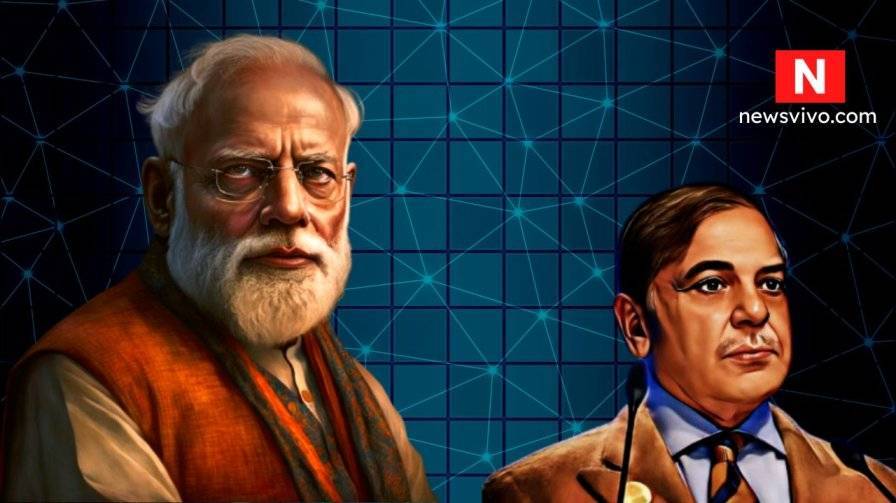
Shehbaz Sharif
As Shehbaz Sharif has drawn in a third nation to whom Pakistan is obliged for periodic economic bailouts and whose relationship with India may be defined as great, his words would appear to bear more significance than regular pronouncements about desiring peace with India.
In an interview with Dubai-based Al Arabiya, Prime Minister Shehbaz Sharif stated that Pakistan desired “serious and sincere talks” with India and that he had asked UAE President Sheikh Mohamed bin Zayed to use his friendly ties with New Delhi to bring the two sides to the table to discuss all outstanding issues Shehbaz Sharif specifically mentioned “human rights violations in Kashmir” and India’s revocation of J&K’s special status.
Sharif’s remarks appear to be more significant than usual declarations about seeking peace with India since he has included a third nation to whom Pakistan is dependent for periodic economic bailouts and whose relationship with India may be termed as outstanding.
This is especially true given that the UAE previously claimed to have had a role in bringing India and Pakistan to the table. In 2021, a top UAE official revealed his country’s position as a facilitator in a backchannel procedure between the two nations, which was purportedly sponsored by the US, the UK, and France.
The order in which the observations are made is also essential. They come amid allegations that Pakistan is on the verge of a crisis similar to that of Sri Lanka, with its dollar reserves running low and fears growing that it may default on its loans. During his two-day visit to the UAE last week, Shehbaz Sharif urged Pakistan’s “brother” country for support one more time. The UAE has committed to roll over a $2 billion debt and has added additional $1 billion to the total.
Separately, the Saudi Fund for Development has agreed to provide $1 billion toward past-due payments for Pakistan’s oil imports from Saudi Arabia.
Sharif’s visit came shortly after Army Chief Gen Asim Munir completed a tour of both nations. While complimenting the UAE and Saudi Arabia for coming to Pakistan’s rescue “like brothers,” the general also stated that Pakistan could not continue to throw out its hand for a handout and must learn to stand on its own two feet.
This is not a new phrase.
In the Al Arabiya interview, Shehbaz Sharif expressed his desire to “live in peace with India provided we are able to solve our genuine problems” — “to resolve our burning issues like Kashmir where flagrant human rights are taking place day in and day out, and two, they (India) reversed whatever semblance of autonomy was given to the Kashmiris in their Constitution through article 370.
He did not specify what he expected India to do, however Pakistan had previously signalled that restoring J&K’s sovereignty was a prerequisite in backchannel discussions. Pakistani journalists Javed Chaudhry and Hamid Mir have discovered that in these backchannel discussions, it was decided to “freeze the Kashmir problem” for 20 years.
Previously, Pakistan’s Prime Minister made similar statements. Both he and his brother, former Prime Minister Nawaz Sharif, have continuously argued that Pakistan ought to make peace with India, and that normalising ties will improve Pakistan’s economy.
Nonetheless, this is the first time that a Pakistani politician has clearly acknowledged that “Pakistan has learnt its lessons” from its three wars with India, which had only delivered “more misery, unemployment, poverty”.
The position of the Pakistan Army
The Army’s last substantial words on India were in 2021, when its former head Gen Qamar Javed Bajwa (retired) made a strong plea for trade between the nations in a major speech – pushing for “geoeconomics” rather than geostrategy.
Gen Munir, who took over from Gen Bajwa on November 29, 2022, made the lone statement about India during a tour of the LoC – if attacked, Pakistani soldiers will “defend every inch of our homeland,” he stated.
The Prime Minister’s Office quickly released a clarification on Shehbaz Sharif‘s interview with Al Arabiya, emphasising that reversing India’s “illegal activities” in Kashmir was a non-negotiable prerequisite. This hints that the Pak Army may not have taken kindly to the PM’s words, especially the “lessons-learnt-from-three wars” aspect of it — since this speaks directly to the Army’s failures, and to its involvement in establishing up an agenda of enmity with India.
“Negotiations are not conceivable till India reverses this decision,” the Pakistan PMO clarified.
Statement evaluation
So, how do we interpret Prime Minister Shehbaz Sharif’s remarks?
Pakistan’s economic troubles have encouraged a wider embrace of the concept of normalising relations with India in recent years. Changes in West Asian geopolitics have brought Pakistan’s “brothers,” the UAE and Saudi Arabia, closer to India – and these two crucial regional actors have pushed this move.
Pakistan’s political and military authorities are also aware that India would not reverse its actions in J&K in August 2019, and that the maximum compromise in this scenario would be the restoration of statehood.
Whatever remained is for both parties to persuade their supporters that normalising relations with a country that most Pakistanis still refer to as “dushman humsaya” is no longer an option, but a must.
The Imran Khan-Bajwa combo attempted and failed, as establishment elements sabotaged a planned initiative to restore some commerce between the two nations.
The way Shehbaz Sharif’s words play out politically, as well as how the Army responds in the coming days, will help to paint a clearer picture.
Veteran Indian watchers are likewise sceptical of the “lessons” Shehbaz Sharif believes Pakistan has learned. In the past, military and civilian authorities have talked eloquently about the consequences of Pakistan’s support for terrorist organisations in order to accomplish its regional strategic objectives, but this has not stopped the Pakistan Army from pursuing its goal of restoring Taliban rule in Afghanistan.